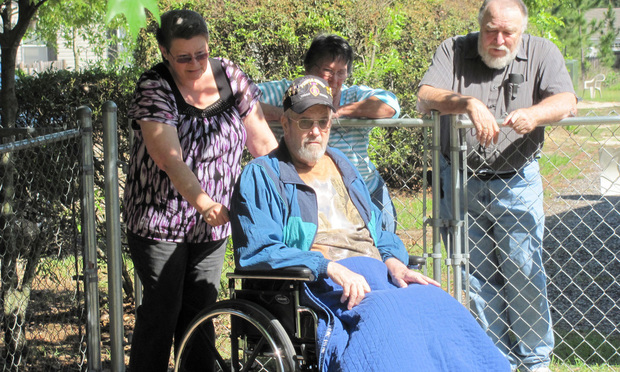Athens Firm Reaches $3.23M Settlement With VA Hospital Despite Damages Cap
Attorneys at Blasingame, Burch, Garrard & Ashley secured the settlement on behalf of a U.S. Army veteran despite South Carolina's $450,000 cap on noneconomic damages in medical malpractice cases.
December 11, 2018 at 02:26 PM
4 minute read
 Mike Egan is pushed by his wife. (Courtesy photo)
Mike Egan is pushed by his wife. (Courtesy photo)
Athens attorney Lee Atkinson says a $3.23 million settlement he and partner Jim Matthews secured for a Vietnam veteran left paralyzed by a lack of treatment at a South Carolina Veterans Affairs hospital is “evidence of systemic problems” at VA hospitals across the Southeast.
“Veterans keep falling through the cracks. Bad things keep happening to them,” Atkinson said in announcing the federal government's decision to settle the medical malpractice case.
“Vets have fairly easily diagnosable conditions that have well-established, well-known, proper treatment,” he added. “But the vets are not sent to the correct specialist to get the treatment they need in a timely fashion.”
Atkinson said he and Matthews—both partners at Blasingame, Burch, Garrard & Ashley in Athens—secured the $3.23 million settlement in October on behalf of 75-year-old U.S. Army veteran George “Mike” Egan. They did so despite South Carolina's $450,000 cap on noneconomic damages in medical malpractice cases, unless a plaintiff can prove gross negligence.
Atkinson said he and Matthews were able to convince government lawyers defending the VA that they could clear that bar.
Despite an MRI clearly showing a ruptured disc and severely compressed nerves in Egan's lower spine, medical personnel at the William Jennings Bryan Dorn VA Medical Center in Columbia, South Carolina, delayed spinal surgery for more than 18 months, Atkinson said.
The Columbia VA didn't have a neurosurgeon on staff, Atkinson said. Instead, its neurosurgery department was staffed by a nurse practitioner who worked under the supervision of a general surgeon.
Rather than send Egan to a spinal surgeon, VA personnel placed Egan on a regimen of increasingly powerful pain medications and epidural injections that did nothing to relieve the damaging pressure on his spinal nerves, Atkinson said. Eventually, Egan was sent to a cognitive behavioral therapist for help with pain management rather than to a surgeon.
Egan initially injured his spine when his helicopter was shot down while he was serving as a crew chief and door gunner with the 1st Air Cavalry Division in Vietnam, Atkinson said.
Following the 2012 MRI and more than a year of ineffective treatment for his pain, Egan lost the ability to stand.
VA personnel drugged him so heavily that Egan became delirious and, as a result, was placed in a medically induced coma for weeks, Atkinson said. When he came to, he had lost all sensation and function of his legs below the waist.
By the time Egan underwent spinal surgery, the compressed nerves were permanently damaged, Atkinson said.
Atkinson said that lawyers with the office of the U.S. Attorney for the District of South Carolina who litigated the case on behalf of the hospital entered settlement negotiations after District Judge Donald Coggins excluded all the government's expert witnesses, said Atkinson, adding that the exclusion of expert witnesses is rare.
Assistant U.S. Attorney Barbara Murcier Bowens, one of the government lawyers who litigated the case, said that as a matter of policy, the office wouldn't comment on the settlement.
Atkinson said he and Matthews originally sought between $5 million and $7 million. The government countered with $3.5 million—which was reduced to just under $3.23 million by the U.S. Department of Justice before it would approve the deal.
The settlement was consummated and the case dismissed on Nov. 5. The funds—including what Atkinson said was a flat 25 percent fee for the attorneys—were distributed in November. The firm announced the deal on Nov. 27—a day after the case was scheduled to go to trial.
Atkinson said the lawyers “never could get a good explanation” as to why VA personnel would not send Egan to a private hospital or to another VA hospital—including one in nearby Augusta, Georgia, which had a neurosurgeon on staff.
“Our suspicion is that money matters,” he said.
This content has been archived. It is available through our partners, LexisNexis® and Bloomberg Law.
To view this content, please continue to their sites.
Not a Lexis Subscriber?
Subscribe Now
Not a Bloomberg Law Subscriber?
Subscribe Now
NOT FOR REPRINT
© 2025 ALM Global, LLC, All Rights Reserved. Request academic re-use from www.copyright.com. All other uses, submit a request to [email protected]. For more information visit Asset & Logo Licensing.
You Might Like
View All
Justice Known for Asking 'Tough Questions' Resolves to Improve Civility
4 minute read

Alston & Bird Adds M&A, Private Equity Team From McDermott in New York
4 minute read
Veteran Federal Trade Law Enforcer Joins King & Spalding in Washington
4 minute readTrending Stories
- 1‘Facebook’s Descent Into Toxic Masculinity’ Prompts Stanford Professor to Drop Meta as Client
- 2Pa. Superior Court: Sorority's Interview Notes Not Shielded From Discovery in Lawsuit Over Student's Death
- 3Kraken’s Chief Legal Officer Exits, Eyes Role in Trump Administration
- 4DOT Nominee Duffy Pledges Safety, Faster Infrastructure Spending in Confirmation Hearing
- 5'Younger and Invigorated Bench': Biden's Legacy in New Jersey Federal Court
Who Got The Work
J. Brugh Lower of Gibbons has entered an appearance for industrial equipment supplier Devco Corporation in a pending trademark infringement lawsuit. The suit, accusing the defendant of selling knock-off Graco products, was filed Dec. 18 in New Jersey District Court by Rivkin Radler on behalf of Graco Inc. and Graco Minnesota. The case, assigned to U.S. District Judge Zahid N. Quraishi, is 3:24-cv-11294, Graco Inc. et al v. Devco Corporation.
Who Got The Work
Rebecca Maller-Stein and Kent A. Yalowitz of Arnold & Porter Kaye Scholer have entered their appearances for Hanaco Venture Capital and its executives, Lior Prosor and David Frankel, in a pending securities lawsuit. The action, filed on Dec. 24 in New York Southern District Court by Zell, Aron & Co. on behalf of Goldeneye Advisors, accuses the defendants of negligently and fraudulently managing the plaintiff's $1 million investment. The case, assigned to U.S. District Judge Vernon S. Broderick, is 1:24-cv-09918, Goldeneye Advisors, LLC v. Hanaco Venture Capital, Ltd. et al.
Who Got The Work
Attorneys from A&O Shearman has stepped in as defense counsel for Toronto-Dominion Bank and other defendants in a pending securities class action. The suit, filed Dec. 11 in New York Southern District Court by Bleichmar Fonti & Auld, accuses the defendants of concealing the bank's 'pervasive' deficiencies in regards to its compliance with the Bank Secrecy Act and the quality of its anti-money laundering controls. The case, assigned to U.S. District Judge Arun Subramanian, is 1:24-cv-09445, Gonzalez v. The Toronto-Dominion Bank et al.
Who Got The Work
Crown Castle International, a Pennsylvania company providing shared communications infrastructure, has turned to Luke D. Wolf of Gordon Rees Scully Mansukhani to fend off a pending breach-of-contract lawsuit. The court action, filed Nov. 25 in Michigan Eastern District Court by Hooper Hathaway PC on behalf of The Town Residences LLC, accuses Crown Castle of failing to transfer approximately $30,000 in utility payments from T-Mobile in breach of a roof-top lease and assignment agreement. The case, assigned to U.S. District Judge Susan K. Declercq, is 2:24-cv-13131, The Town Residences LLC v. T-Mobile US, Inc. et al.
Who Got The Work
Wilfred P. Coronato and Daniel M. Schwartz of McCarter & English have stepped in as defense counsel to Electrolux Home Products Inc. in a pending product liability lawsuit. The court action, filed Nov. 26 in New York Eastern District Court by Poulos Lopiccolo PC and Nagel Rice LLP on behalf of David Stern, alleges that the defendant's refrigerators’ drawers and shelving repeatedly break and fall apart within months after purchase. The case, assigned to U.S. District Judge Joan M. Azrack, is 2:24-cv-08204, Stern v. Electrolux Home Products, Inc.
Featured Firms
Law Offices of Gary Martin Hays & Associates, P.C.
(470) 294-1674
Law Offices of Mark E. Salomone
(857) 444-6468
Smith & Hassler
(713) 739-1250






